Project Management Report: Risk Management Analysis, 7BSP1244
VerifiedAdded on 2023/01/19
|11
|3059
|65
Report
AI Summary
This report provides a comprehensive analysis of project risk management, examining its critical role in achieving project success. It begins by defining risk management within the PMBOK framework, highlighting its significance in identifying, assessing, and mitigating potential risks throughout the project lifecycle. The report delves into the importance of risk assessment and the development of mitigation strategies, emphasizing their impact on project schedules, costs, and overall performance. Furthermore, it explores the project manager's responsibilities in communicating risk management plans to stakeholders and team members, ensuring alignment and proactive responses to challenges. The analysis extends to the incorporation of project manager roles, skills, and competencies, underscoring their influence in delivering projects effectively. The report also examines the interdependencies between risk management and other knowledge areas, such as scope, schedule, and cost management, demonstrating how effective risk management contributes to the overall success of project implementation. The report uses peer-reviewed journals and academic sources to demonstrate the importance of risk management.
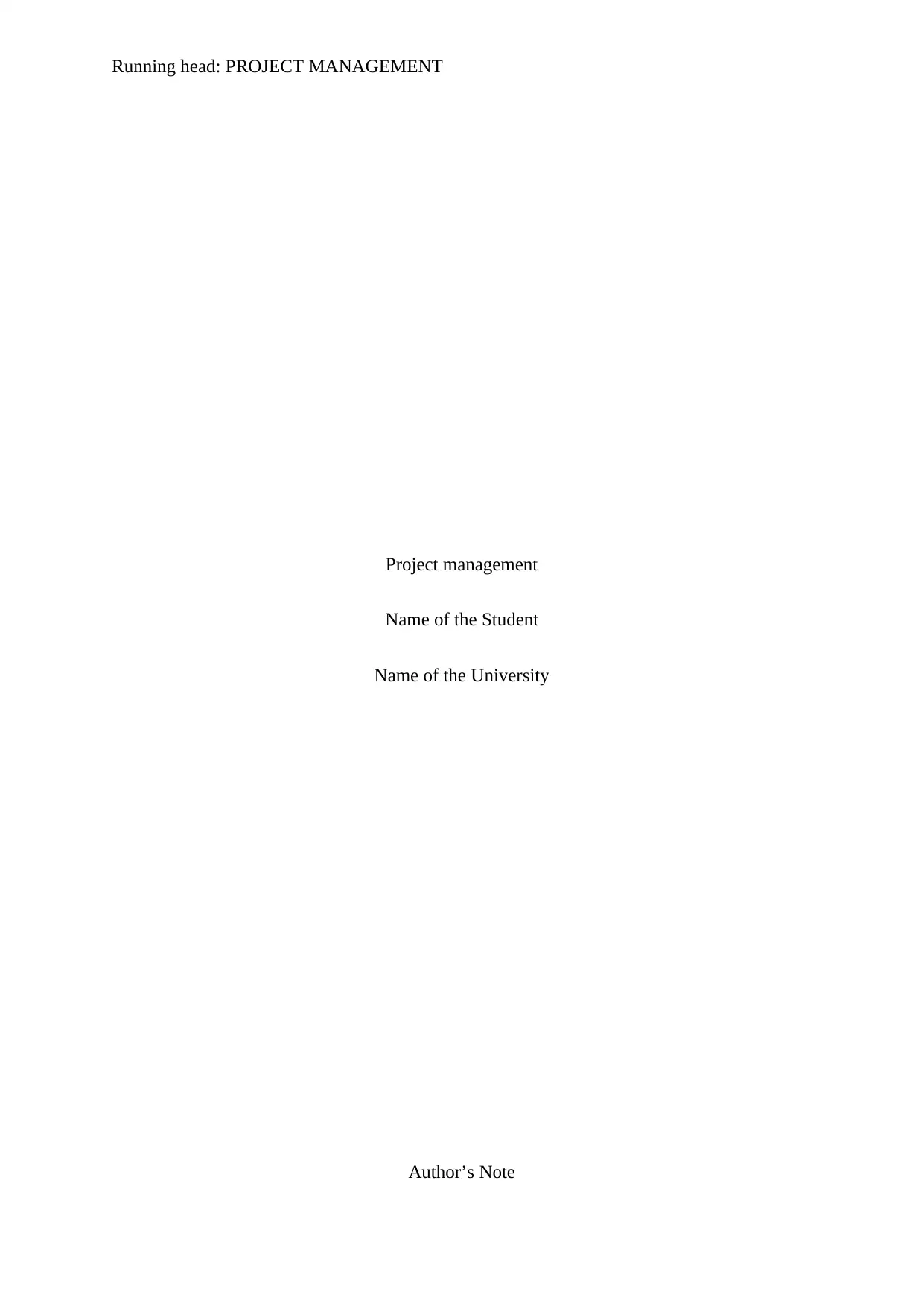
Running head: PROJECT MANAGEMENT
Project management
Name of the Student
Name of the University
Author’s Note
Project management
Name of the Student
Name of the University
Author’s Note
Paraphrase This Document
Need a fresh take? Get an instant paraphrase of this document with our AI Paraphraser
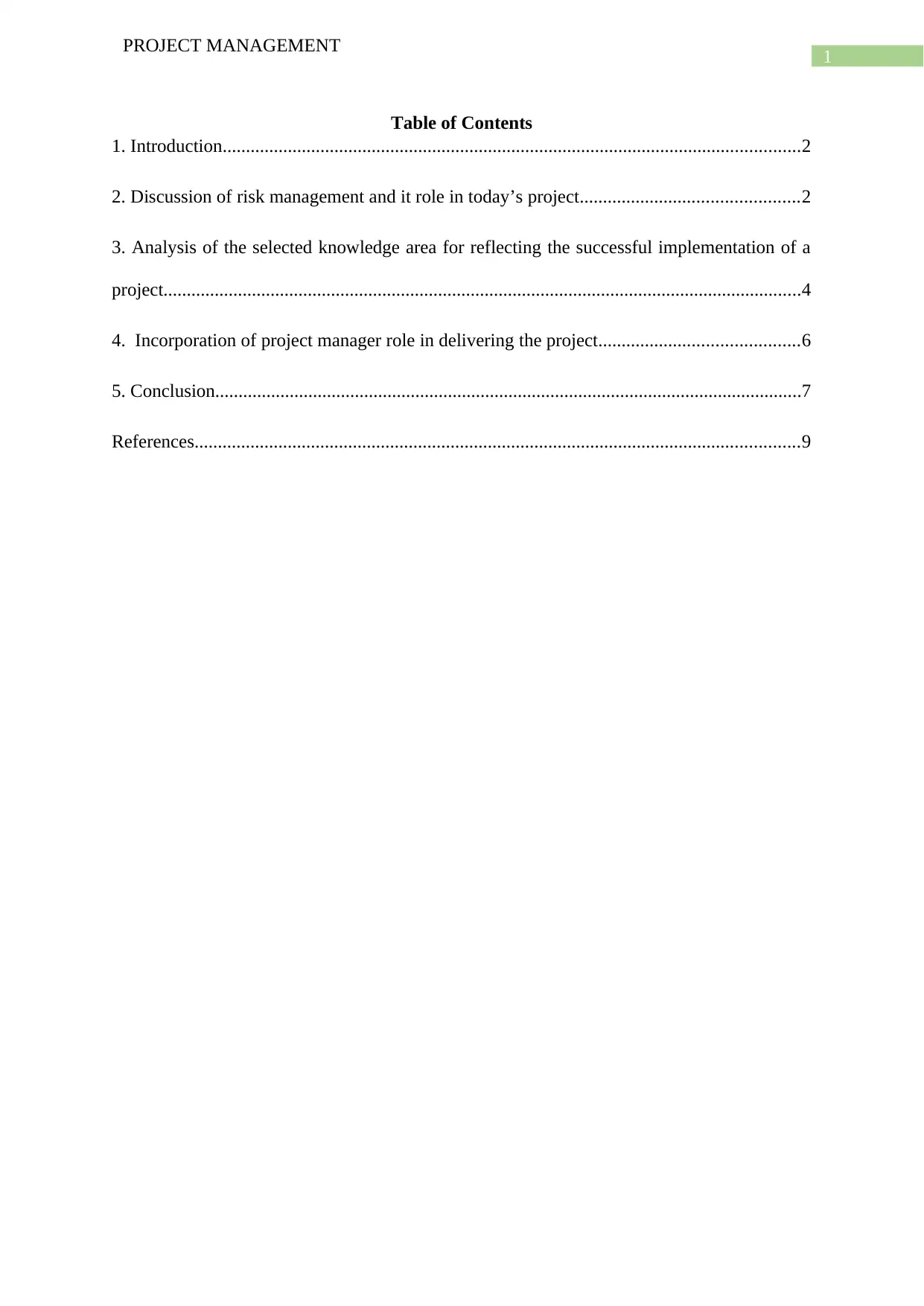
1
PROJECT MANAGEMENT
Table of Contents
1. Introduction............................................................................................................................2
2. Discussion of risk management and it role in today’s project...............................................2
3. Analysis of the selected knowledge area for reflecting the successful implementation of a
project.........................................................................................................................................4
4. Incorporation of project manager role in delivering the project...........................................6
5. Conclusion..............................................................................................................................7
References..................................................................................................................................9
PROJECT MANAGEMENT
Table of Contents
1. Introduction............................................................................................................................2
2. Discussion of risk management and it role in today’s project...............................................2
3. Analysis of the selected knowledge area for reflecting the successful implementation of a
project.........................................................................................................................................4
4. Incorporation of project manager role in delivering the project...........................................6
5. Conclusion..............................................................................................................................7
References..................................................................................................................................9
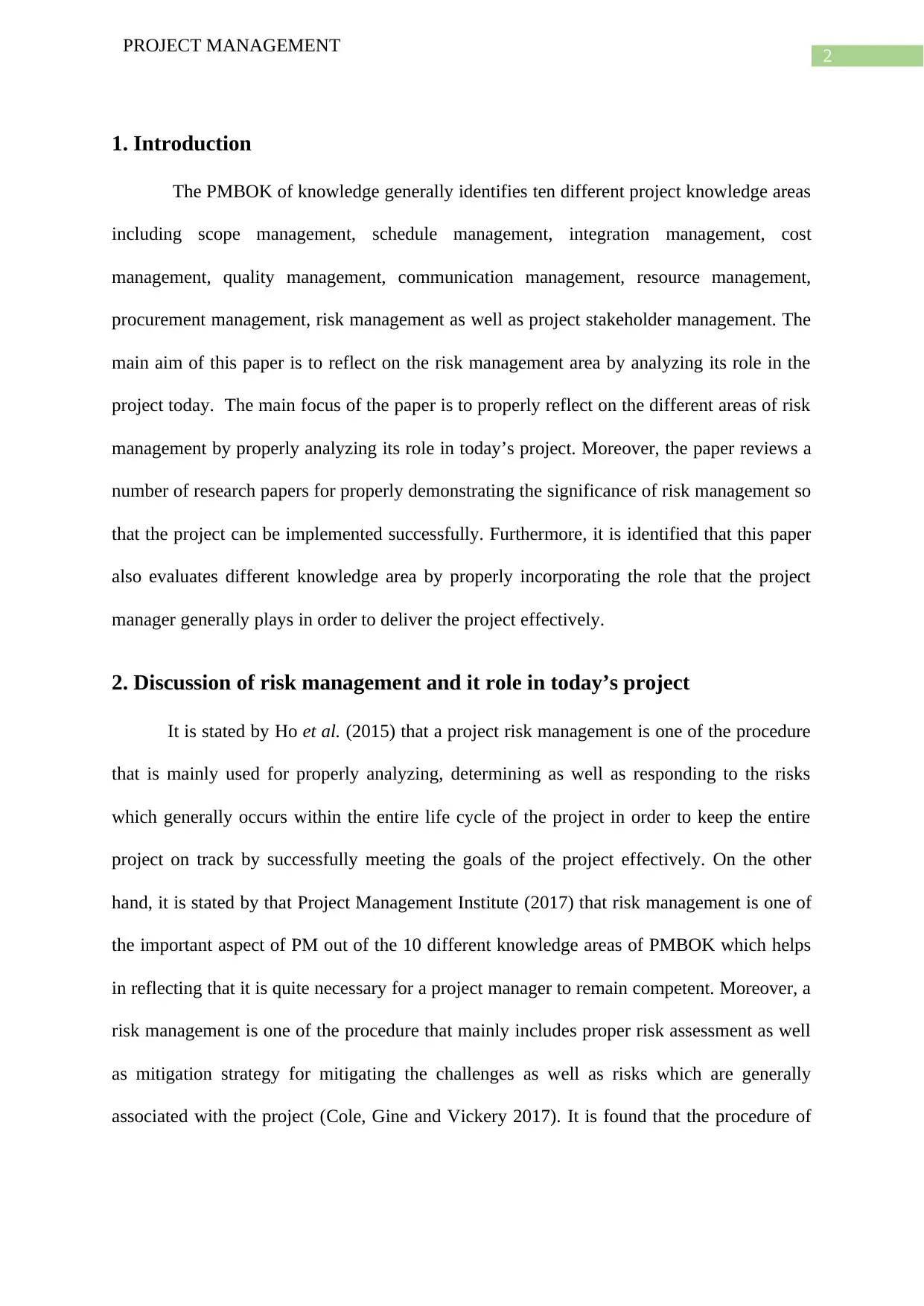
2
PROJECT MANAGEMENT
1. Introduction
The PMBOK of knowledge generally identifies ten different project knowledge areas
including scope management, schedule management, integration management, cost
management, quality management, communication management, resource management,
procurement management, risk management as well as project stakeholder management. The
main aim of this paper is to reflect on the risk management area by analyzing its role in the
project today. The main focus of the paper is to properly reflect on the different areas of risk
management by properly analyzing its role in today’s project. Moreover, the paper reviews a
number of research papers for properly demonstrating the significance of risk management so
that the project can be implemented successfully. Furthermore, it is identified that this paper
also evaluates different knowledge area by properly incorporating the role that the project
manager generally plays in order to deliver the project effectively.
2. Discussion of risk management and it role in today’s project
It is stated by Ho et al. (2015) that a project risk management is one of the procedure
that is mainly used for properly analyzing, determining as well as responding to the risks
which generally occurs within the entire life cycle of the project in order to keep the entire
project on track by successfully meeting the goals of the project effectively. On the other
hand, it is stated by that Project Management Institute (2017) that risk management is one of
the important aspect of PM out of the 10 different knowledge areas of PMBOK which helps
in reflecting that it is quite necessary for a project manager to remain competent. Moreover, a
risk management is one of the procedure that mainly includes proper risk assessment as well
as mitigation strategy for mitigating the challenges as well as risks which are generally
associated with the project (Cole, Gine and Vickery 2017). It is found that the procedure of
PROJECT MANAGEMENT
1. Introduction
The PMBOK of knowledge generally identifies ten different project knowledge areas
including scope management, schedule management, integration management, cost
management, quality management, communication management, resource management,
procurement management, risk management as well as project stakeholder management. The
main aim of this paper is to reflect on the risk management area by analyzing its role in the
project today. The main focus of the paper is to properly reflect on the different areas of risk
management by properly analyzing its role in today’s project. Moreover, the paper reviews a
number of research papers for properly demonstrating the significance of risk management so
that the project can be implemented successfully. Furthermore, it is identified that this paper
also evaluates different knowledge area by properly incorporating the role that the project
manager generally plays in order to deliver the project effectively.
2. Discussion of risk management and it role in today’s project
It is stated by Ho et al. (2015) that a project risk management is one of the procedure
that is mainly used for properly analyzing, determining as well as responding to the risks
which generally occurs within the entire life cycle of the project in order to keep the entire
project on track by successfully meeting the goals of the project effectively. On the other
hand, it is stated by that Project Management Institute (2017) that risk management is one of
the important aspect of PM out of the 10 different knowledge areas of PMBOK which helps
in reflecting that it is quite necessary for a project manager to remain competent. Moreover, a
risk management is one of the procedure that mainly includes proper risk assessment as well
as mitigation strategy for mitigating the challenges as well as risks which are generally
associated with the project (Cole, Gine and Vickery 2017). It is found that the procedure of
⊘ This is a preview!⊘
Do you want full access?
Subscribe today to unlock all pages.

Trusted by 1+ million students worldwide
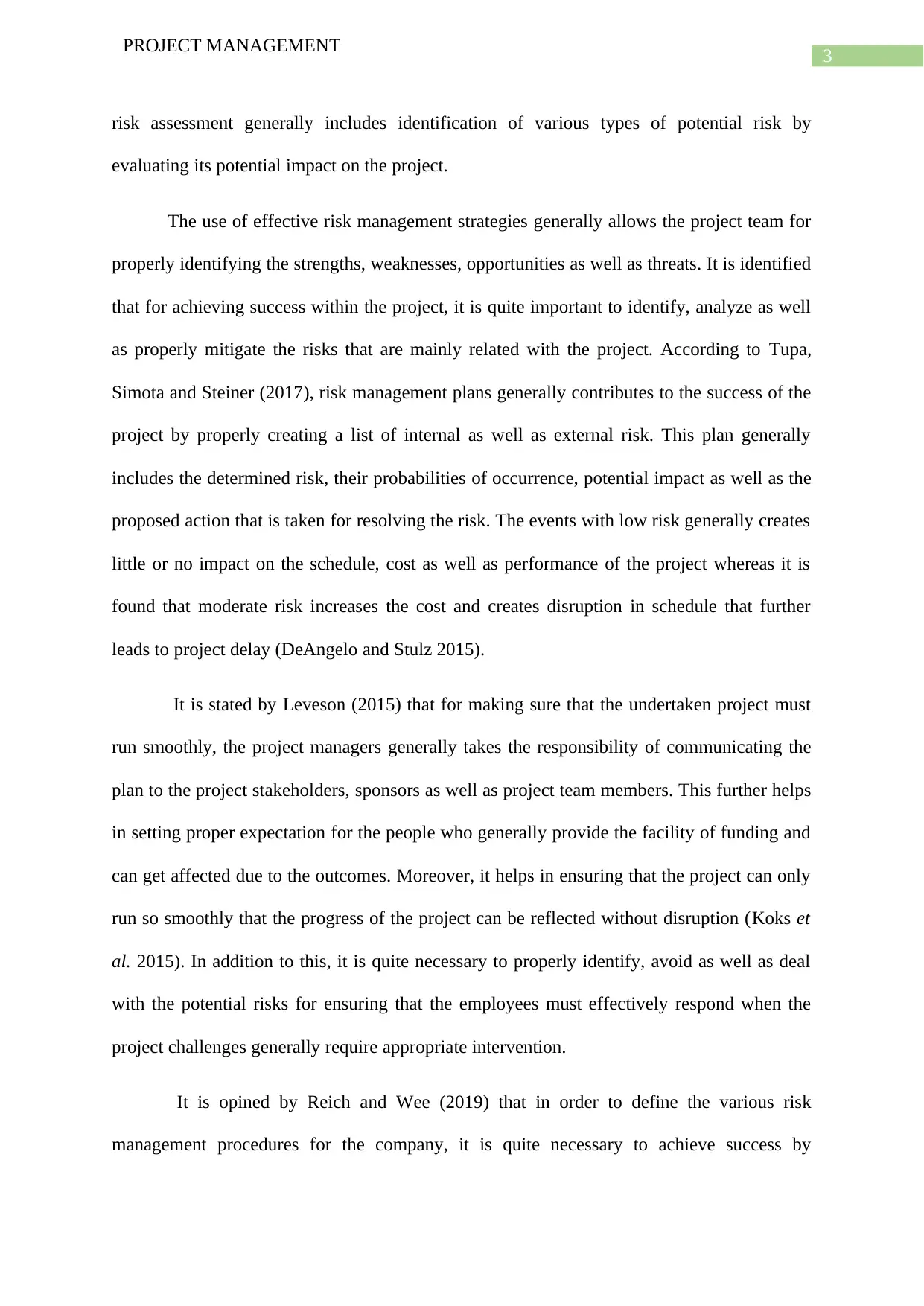
3
PROJECT MANAGEMENT
risk assessment generally includes identification of various types of potential risk by
evaluating its potential impact on the project.
The use of effective risk management strategies generally allows the project team for
properly identifying the strengths, weaknesses, opportunities as well as threats. It is identified
that for achieving success within the project, it is quite important to identify, analyze as well
as properly mitigate the risks that are mainly related with the project. According to Tupa,
Simota and Steiner (2017), risk management plans generally contributes to the success of the
project by properly creating a list of internal as well as external risk. This plan generally
includes the determined risk, their probabilities of occurrence, potential impact as well as the
proposed action that is taken for resolving the risk. The events with low risk generally creates
little or no impact on the schedule, cost as well as performance of the project whereas it is
found that moderate risk increases the cost and creates disruption in schedule that further
leads to project delay (DeAngelo and Stulz 2015).
It is stated by Leveson (2015) that for making sure that the undertaken project must
run smoothly, the project managers generally takes the responsibility of communicating the
plan to the project stakeholders, sponsors as well as project team members. This further helps
in setting proper expectation for the people who generally provide the facility of funding and
can get affected due to the outcomes. Moreover, it helps in ensuring that the project can only
run so smoothly that the progress of the project can be reflected without disruption (Koks et
al. 2015). In addition to this, it is quite necessary to properly identify, avoid as well as deal
with the potential risks for ensuring that the employees must effectively respond when the
project challenges generally require appropriate intervention.
It is opined by Reich and Wee (2019) that in order to define the various risk
management procedures for the company, it is quite necessary to achieve success by
PROJECT MANAGEMENT
risk assessment generally includes identification of various types of potential risk by
evaluating its potential impact on the project.
The use of effective risk management strategies generally allows the project team for
properly identifying the strengths, weaknesses, opportunities as well as threats. It is identified
that for achieving success within the project, it is quite important to identify, analyze as well
as properly mitigate the risks that are mainly related with the project. According to Tupa,
Simota and Steiner (2017), risk management plans generally contributes to the success of the
project by properly creating a list of internal as well as external risk. This plan generally
includes the determined risk, their probabilities of occurrence, potential impact as well as the
proposed action that is taken for resolving the risk. The events with low risk generally creates
little or no impact on the schedule, cost as well as performance of the project whereas it is
found that moderate risk increases the cost and creates disruption in schedule that further
leads to project delay (DeAngelo and Stulz 2015).
It is stated by Leveson (2015) that for making sure that the undertaken project must
run smoothly, the project managers generally takes the responsibility of communicating the
plan to the project stakeholders, sponsors as well as project team members. This further helps
in setting proper expectation for the people who generally provide the facility of funding and
can get affected due to the outcomes. Moreover, it helps in ensuring that the project can only
run so smoothly that the progress of the project can be reflected without disruption (Koks et
al. 2015). In addition to this, it is quite necessary to properly identify, avoid as well as deal
with the potential risks for ensuring that the employees must effectively respond when the
project challenges generally require appropriate intervention.
It is opined by Reich and Wee (2019) that in order to define the various risk
management procedures for the company, it is quite necessary to achieve success by
Paraphrase This Document
Need a fresh take? Get an instant paraphrase of this document with our AI Paraphraser
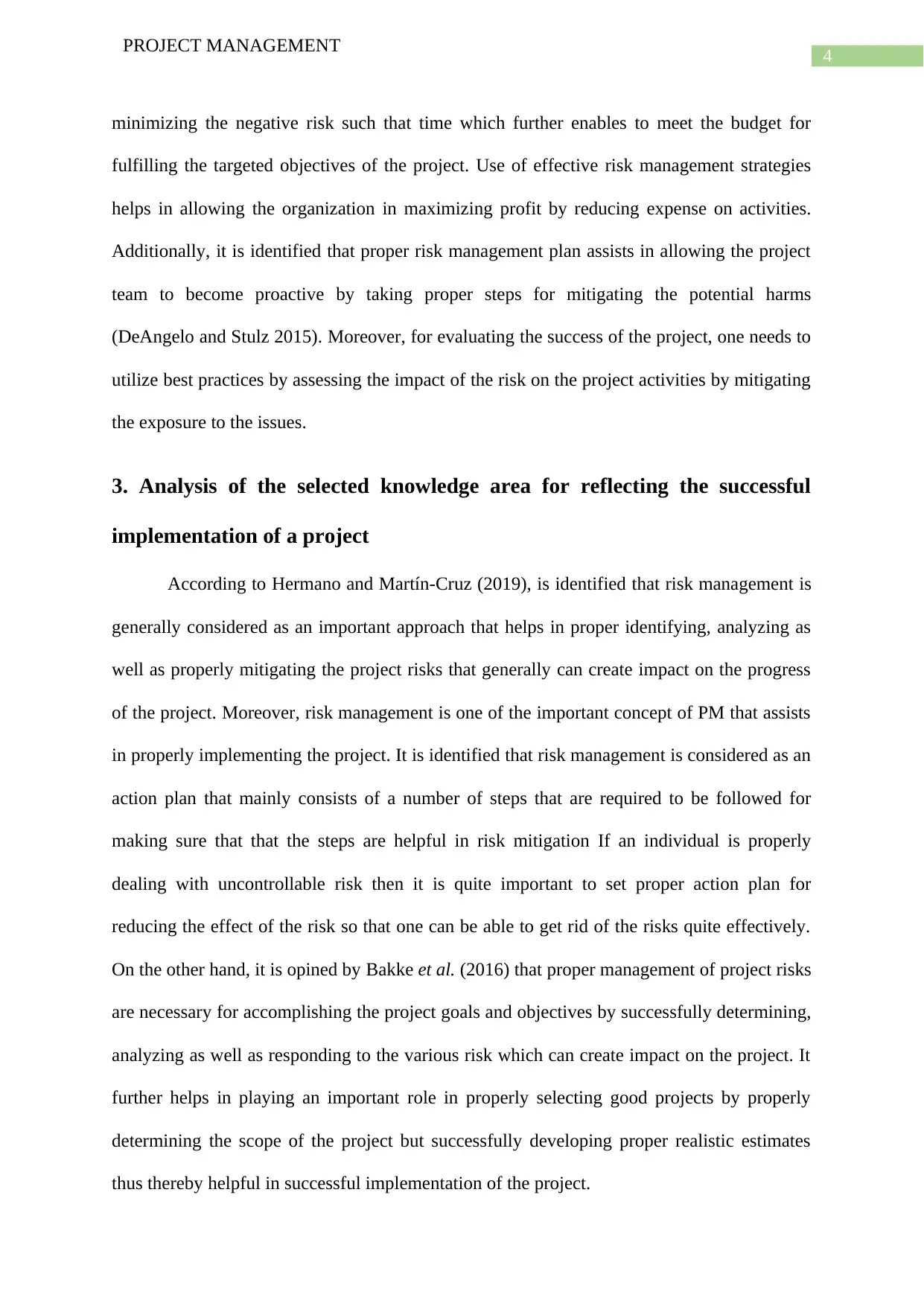
4
PROJECT MANAGEMENT
minimizing the negative risk such that time which further enables to meet the budget for
fulfilling the targeted objectives of the project. Use of effective risk management strategies
helps in allowing the organization in maximizing profit by reducing expense on activities.
Additionally, it is identified that proper risk management plan assists in allowing the project
team to become proactive by taking proper steps for mitigating the potential harms
(DeAngelo and Stulz 2015). Moreover, for evaluating the success of the project, one needs to
utilize best practices by assessing the impact of the risk on the project activities by mitigating
the exposure to the issues.
3. Analysis of the selected knowledge area for reflecting the successful
implementation of a project
According to Hermano and Martín-Cruz (2019), is identified that risk management is
generally considered as an important approach that helps in proper identifying, analyzing as
well as properly mitigating the project risks that generally can create impact on the progress
of the project. Moreover, risk management is one of the important concept of PM that assists
in properly implementing the project. It is identified that risk management is considered as an
action plan that mainly consists of a number of steps that are required to be followed for
making sure that that the steps are helpful in risk mitigation If an individual is properly
dealing with uncontrollable risk then it is quite important to set proper action plan for
reducing the effect of the risk so that one can be able to get rid of the risks quite effectively.
On the other hand, it is opined by Bakke et al. (2016) that proper management of project risks
are necessary for accomplishing the project goals and objectives by successfully determining,
analyzing as well as responding to the various risk which can create impact on the project. It
further helps in playing an important role in properly selecting good projects by properly
determining the scope of the project but successfully developing proper realistic estimates
thus thereby helpful in successful implementation of the project.
PROJECT MANAGEMENT
minimizing the negative risk such that time which further enables to meet the budget for
fulfilling the targeted objectives of the project. Use of effective risk management strategies
helps in allowing the organization in maximizing profit by reducing expense on activities.
Additionally, it is identified that proper risk management plan assists in allowing the project
team to become proactive by taking proper steps for mitigating the potential harms
(DeAngelo and Stulz 2015). Moreover, for evaluating the success of the project, one needs to
utilize best practices by assessing the impact of the risk on the project activities by mitigating
the exposure to the issues.
3. Analysis of the selected knowledge area for reflecting the successful
implementation of a project
According to Hermano and Martín-Cruz (2019), is identified that risk management is
generally considered as an important approach that helps in proper identifying, analyzing as
well as properly mitigating the project risks that generally can create impact on the progress
of the project. Moreover, risk management is one of the important concept of PM that assists
in properly implementing the project. It is identified that risk management is considered as an
action plan that mainly consists of a number of steps that are required to be followed for
making sure that that the steps are helpful in risk mitigation If an individual is properly
dealing with uncontrollable risk then it is quite important to set proper action plan for
reducing the effect of the risk so that one can be able to get rid of the risks quite effectively.
On the other hand, it is opined by Bakke et al. (2016) that proper management of project risks
are necessary for accomplishing the project goals and objectives by successfully determining,
analyzing as well as responding to the various risk which can create impact on the project. It
further helps in playing an important role in properly selecting good projects by properly
determining the scope of the project but successfully developing proper realistic estimates
thus thereby helpful in successful implementation of the project.
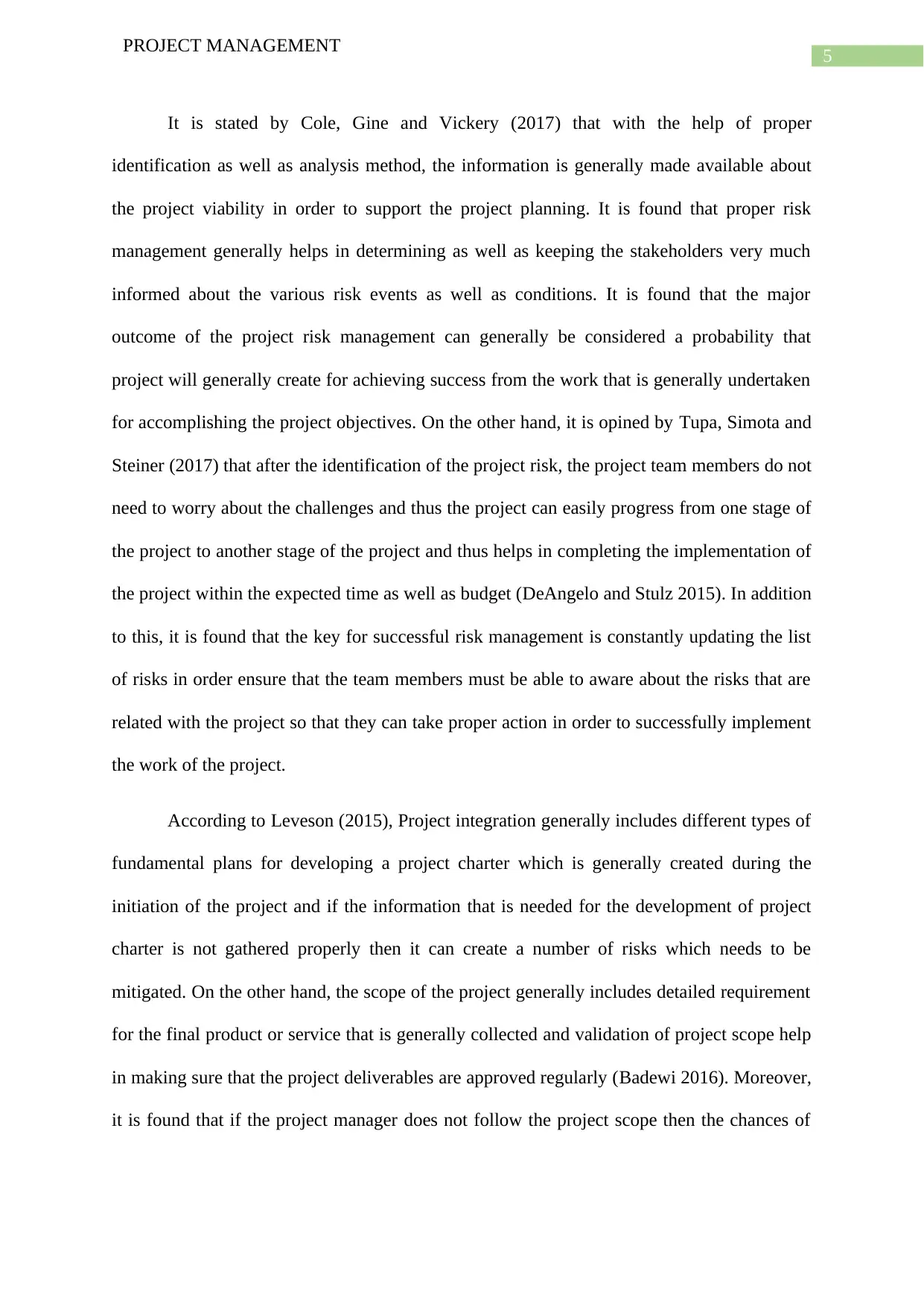
5
PROJECT MANAGEMENT
It is stated by Cole, Gine and Vickery (2017) that with the help of proper
identification as well as analysis method, the information is generally made available about
the project viability in order to support the project planning. It is found that proper risk
management generally helps in determining as well as keeping the stakeholders very much
informed about the various risk events as well as conditions. It is found that the major
outcome of the project risk management can generally be considered a probability that
project will generally create for achieving success from the work that is generally undertaken
for accomplishing the project objectives. On the other hand, it is opined by Tupa, Simota and
Steiner (2017) that after the identification of the project risk, the project team members do not
need to worry about the challenges and thus the project can easily progress from one stage of
the project to another stage of the project and thus helps in completing the implementation of
the project within the expected time as well as budget (DeAngelo and Stulz 2015). In addition
to this, it is found that the key for successful risk management is constantly updating the list
of risks in order ensure that the team members must be able to aware about the risks that are
related with the project so that they can take proper action in order to successfully implement
the work of the project.
According to Leveson (2015), Project integration generally includes different types of
fundamental plans for developing a project charter which is generally created during the
initiation of the project and if the information that is needed for the development of project
charter is not gathered properly then it can create a number of risks which needs to be
mitigated. On the other hand, the scope of the project generally includes detailed requirement
for the final product or service that is generally collected and validation of project scope help
in making sure that the project deliverables are approved regularly (Badewi 2016). Moreover,
it is found that if the project manager does not follow the project scope then the chances of
PROJECT MANAGEMENT
It is stated by Cole, Gine and Vickery (2017) that with the help of proper
identification as well as analysis method, the information is generally made available about
the project viability in order to support the project planning. It is found that proper risk
management generally helps in determining as well as keeping the stakeholders very much
informed about the various risk events as well as conditions. It is found that the major
outcome of the project risk management can generally be considered a probability that
project will generally create for achieving success from the work that is generally undertaken
for accomplishing the project objectives. On the other hand, it is opined by Tupa, Simota and
Steiner (2017) that after the identification of the project risk, the project team members do not
need to worry about the challenges and thus the project can easily progress from one stage of
the project to another stage of the project and thus helps in completing the implementation of
the project within the expected time as well as budget (DeAngelo and Stulz 2015). In addition
to this, it is found that the key for successful risk management is constantly updating the list
of risks in order ensure that the team members must be able to aware about the risks that are
related with the project so that they can take proper action in order to successfully implement
the work of the project.
According to Leveson (2015), Project integration generally includes different types of
fundamental plans for developing a project charter which is generally created during the
initiation of the project and if the information that is needed for the development of project
charter is not gathered properly then it can create a number of risks which needs to be
mitigated. On the other hand, the scope of the project generally includes detailed requirement
for the final product or service that is generally collected and validation of project scope help
in making sure that the project deliverables are approved regularly (Badewi 2016). Moreover,
it is found that if the project manager does not follow the project scope then the chances of
⊘ This is a preview!⊘
Do you want full access?
Subscribe today to unlock all pages.

Trusted by 1+ million students worldwide
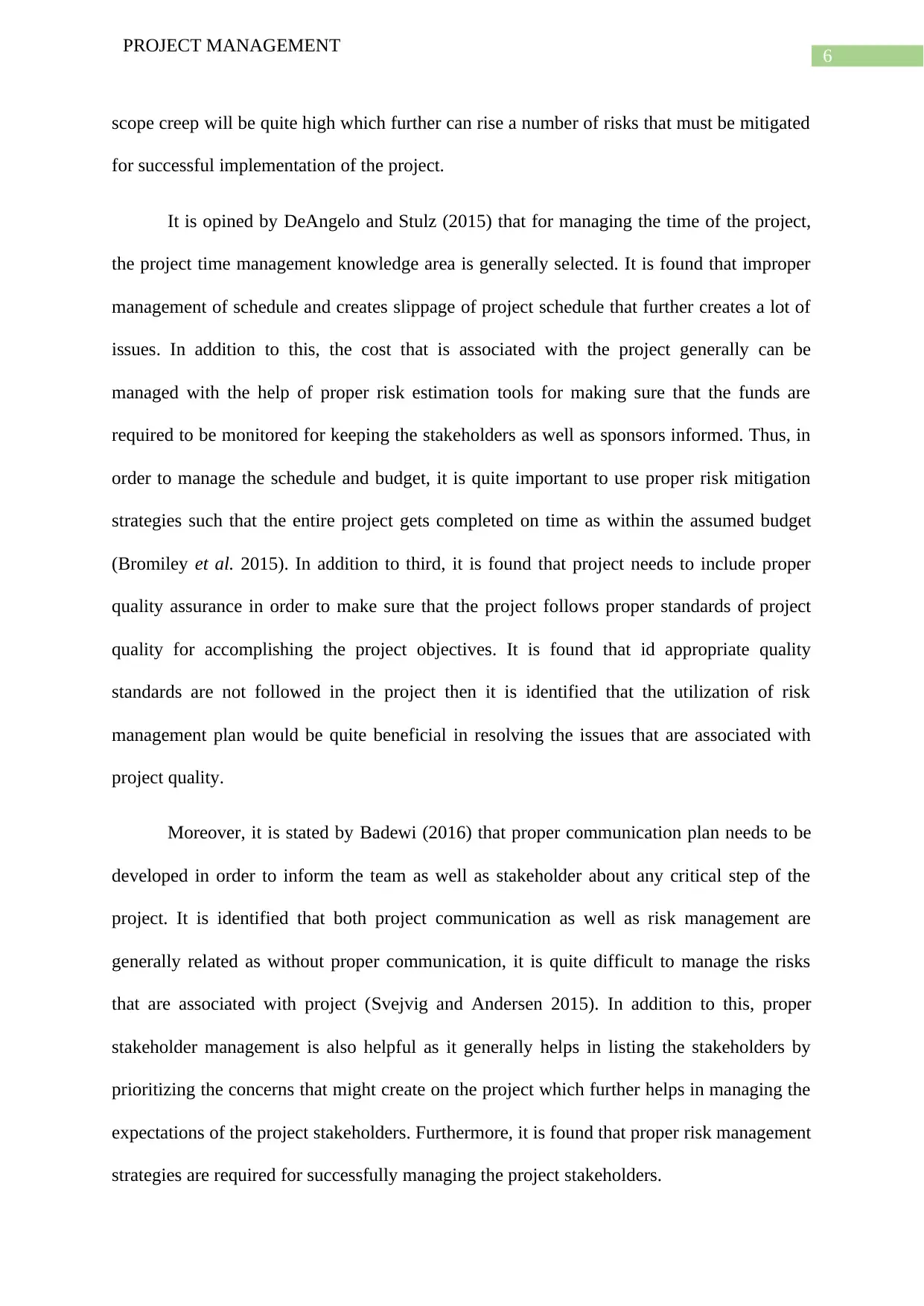
6
PROJECT MANAGEMENT
scope creep will be quite high which further can rise a number of risks that must be mitigated
for successful implementation of the project.
It is opined by DeAngelo and Stulz (2015) that for managing the time of the project,
the project time management knowledge area is generally selected. It is found that improper
management of schedule and creates slippage of project schedule that further creates a lot of
issues. In addition to this, the cost that is associated with the project generally can be
managed with the help of proper risk estimation tools for making sure that the funds are
required to be monitored for keeping the stakeholders as well as sponsors informed. Thus, in
order to manage the schedule and budget, it is quite important to use proper risk mitigation
strategies such that the entire project gets completed on time as within the assumed budget
(Bromiley et al. 2015). In addition to third, it is found that project needs to include proper
quality assurance in order to make sure that the project follows proper standards of project
quality for accomplishing the project objectives. It is found that id appropriate quality
standards are not followed in the project then it is identified that the utilization of risk
management plan would be quite beneficial in resolving the issues that are associated with
project quality.
Moreover, it is stated by Badewi (2016) that proper communication plan needs to be
developed in order to inform the team as well as stakeholder about any critical step of the
project. It is identified that both project communication as well as risk management are
generally related as without proper communication, it is quite difficult to manage the risks
that are associated with project (Svejvig and Andersen 2015). In addition to this, proper
stakeholder management is also helpful as it generally helps in listing the stakeholders by
prioritizing the concerns that might create on the project which further helps in managing the
expectations of the project stakeholders. Furthermore, it is found that proper risk management
strategies are required for successfully managing the project stakeholders.
PROJECT MANAGEMENT
scope creep will be quite high which further can rise a number of risks that must be mitigated
for successful implementation of the project.
It is opined by DeAngelo and Stulz (2015) that for managing the time of the project,
the project time management knowledge area is generally selected. It is found that improper
management of schedule and creates slippage of project schedule that further creates a lot of
issues. In addition to this, the cost that is associated with the project generally can be
managed with the help of proper risk estimation tools for making sure that the funds are
required to be monitored for keeping the stakeholders as well as sponsors informed. Thus, in
order to manage the schedule and budget, it is quite important to use proper risk mitigation
strategies such that the entire project gets completed on time as within the assumed budget
(Bromiley et al. 2015). In addition to third, it is found that project needs to include proper
quality assurance in order to make sure that the project follows proper standards of project
quality for accomplishing the project objectives. It is found that id appropriate quality
standards are not followed in the project then it is identified that the utilization of risk
management plan would be quite beneficial in resolving the issues that are associated with
project quality.
Moreover, it is stated by Badewi (2016) that proper communication plan needs to be
developed in order to inform the team as well as stakeholder about any critical step of the
project. It is identified that both project communication as well as risk management are
generally related as without proper communication, it is quite difficult to manage the risks
that are associated with project (Svejvig and Andersen 2015). In addition to this, proper
stakeholder management is also helpful as it generally helps in listing the stakeholders by
prioritizing the concerns that might create on the project which further helps in managing the
expectations of the project stakeholders. Furthermore, it is found that proper risk management
strategies are required for successfully managing the project stakeholders.
Paraphrase This Document
Need a fresh take? Get an instant paraphrase of this document with our AI Paraphraser
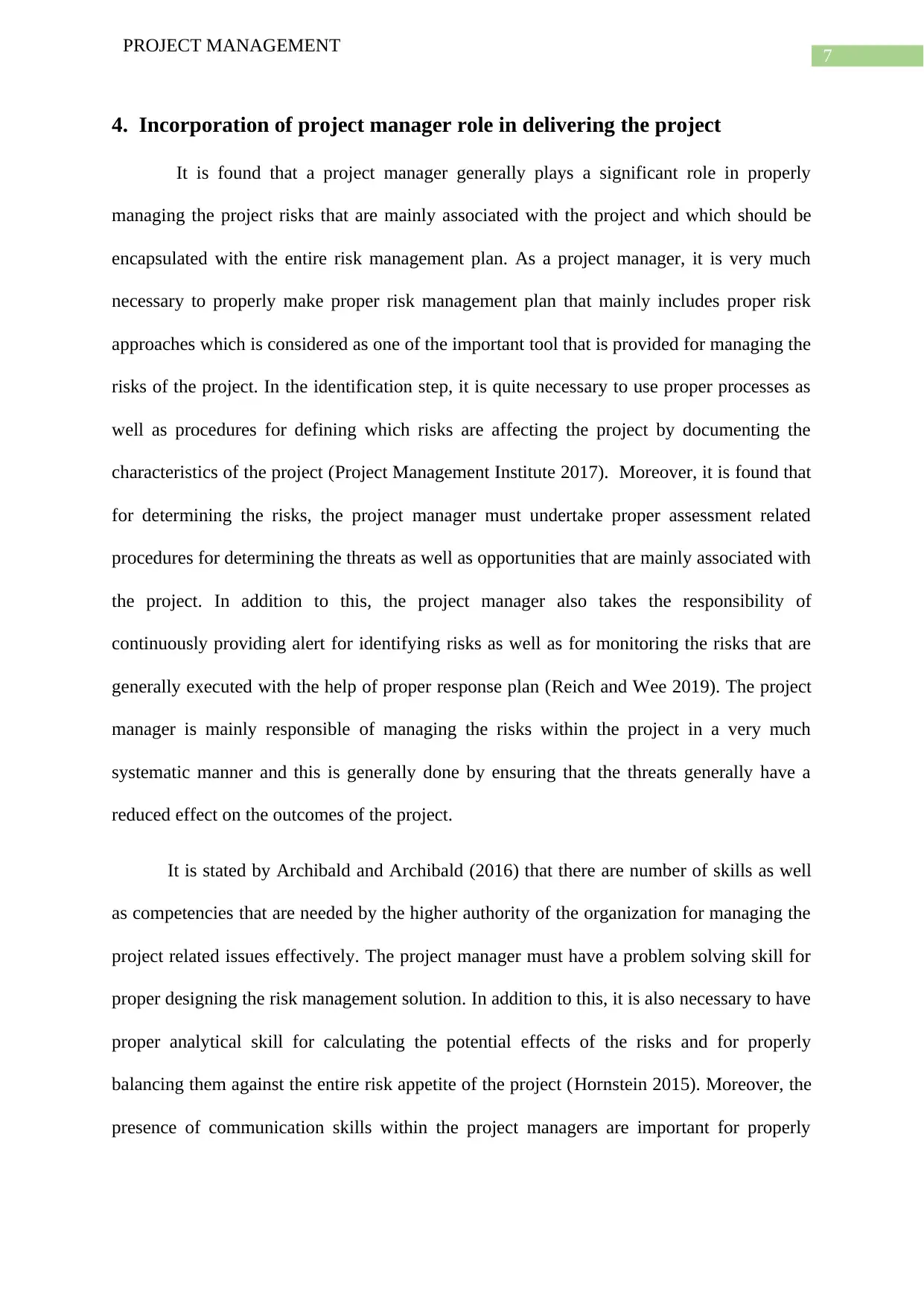
7
PROJECT MANAGEMENT
4. Incorporation of project manager role in delivering the project
It is found that a project manager generally plays a significant role in properly
managing the project risks that are mainly associated with the project and which should be
encapsulated with the entire risk management plan. As a project manager, it is very much
necessary to properly make proper risk management plan that mainly includes proper risk
approaches which is considered as one of the important tool that is provided for managing the
risks of the project. In the identification step, it is quite necessary to use proper processes as
well as procedures for defining which risks are affecting the project by documenting the
characteristics of the project (Project Management Institute 2017). Moreover, it is found that
for determining the risks, the project manager must undertake proper assessment related
procedures for determining the threats as well as opportunities that are mainly associated with
the project. In addition to this, the project manager also takes the responsibility of
continuously providing alert for identifying risks as well as for monitoring the risks that are
generally executed with the help of proper response plan (Reich and Wee 2019). The project
manager is mainly responsible of managing the risks within the project in a very much
systematic manner and this is generally done by ensuring that the threats generally have a
reduced effect on the outcomes of the project.
It is stated by Archibald and Archibald (2016) that there are number of skills as well
as competencies that are needed by the higher authority of the organization for managing the
project related issues effectively. The project manager must have a problem solving skill for
proper designing the risk management solution. In addition to this, it is also necessary to have
proper analytical skill for calculating the potential effects of the risks and for properly
balancing them against the entire risk appetite of the project (Hornstein 2015). Moreover, the
presence of communication skills within the project managers are important for properly
PROJECT MANAGEMENT
4. Incorporation of project manager role in delivering the project
It is found that a project manager generally plays a significant role in properly
managing the project risks that are mainly associated with the project and which should be
encapsulated with the entire risk management plan. As a project manager, it is very much
necessary to properly make proper risk management plan that mainly includes proper risk
approaches which is considered as one of the important tool that is provided for managing the
risks of the project. In the identification step, it is quite necessary to use proper processes as
well as procedures for defining which risks are affecting the project by documenting the
characteristics of the project (Project Management Institute 2017). Moreover, it is found that
for determining the risks, the project manager must undertake proper assessment related
procedures for determining the threats as well as opportunities that are mainly associated with
the project. In addition to this, the project manager also takes the responsibility of
continuously providing alert for identifying risks as well as for monitoring the risks that are
generally executed with the help of proper response plan (Reich and Wee 2019). The project
manager is mainly responsible of managing the risks within the project in a very much
systematic manner and this is generally done by ensuring that the threats generally have a
reduced effect on the outcomes of the project.
It is stated by Archibald and Archibald (2016) that there are number of skills as well
as competencies that are needed by the higher authority of the organization for managing the
project related issues effectively. The project manager must have a problem solving skill for
proper designing the risk management solution. In addition to this, it is also necessary to have
proper analytical skill for calculating the potential effects of the risks and for properly
balancing them against the entire risk appetite of the project (Hornstein 2015). Moreover, the
presence of communication skills within the project managers are important for properly
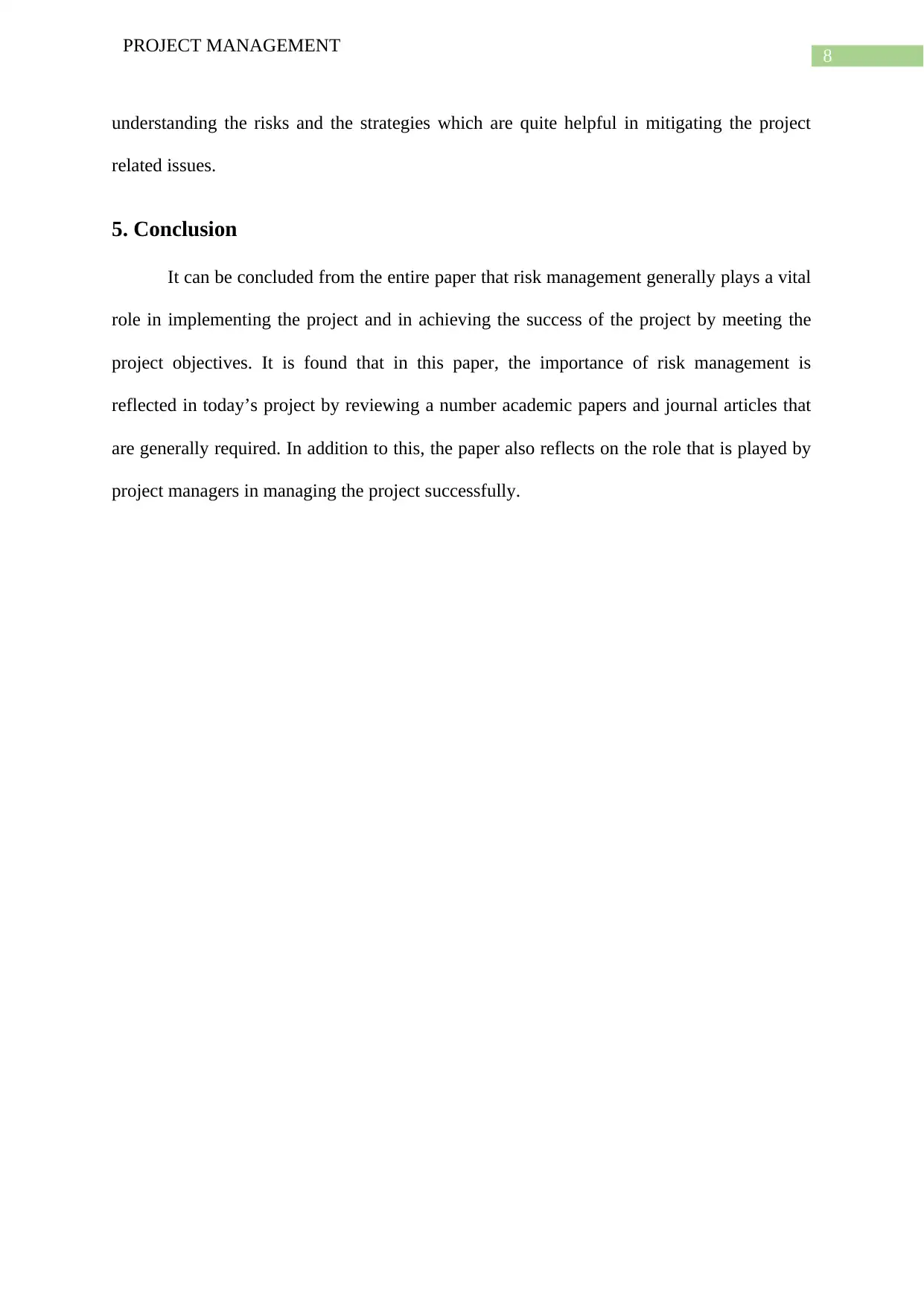
8
PROJECT MANAGEMENT
understanding the risks and the strategies which are quite helpful in mitigating the project
related issues.
5. Conclusion
It can be concluded from the entire paper that risk management generally plays a vital
role in implementing the project and in achieving the success of the project by meeting the
project objectives. It is found that in this paper, the importance of risk management is
reflected in today’s project by reviewing a number academic papers and journal articles that
are generally required. In addition to this, the paper also reflects on the role that is played by
project managers in managing the project successfully.
PROJECT MANAGEMENT
understanding the risks and the strategies which are quite helpful in mitigating the project
related issues.
5. Conclusion
It can be concluded from the entire paper that risk management generally plays a vital
role in implementing the project and in achieving the success of the project by meeting the
project objectives. It is found that in this paper, the importance of risk management is
reflected in today’s project by reviewing a number academic papers and journal articles that
are generally required. In addition to this, the paper also reflects on the role that is played by
project managers in managing the project successfully.
⊘ This is a preview!⊘
Do you want full access?
Subscribe today to unlock all pages.

Trusted by 1+ million students worldwide
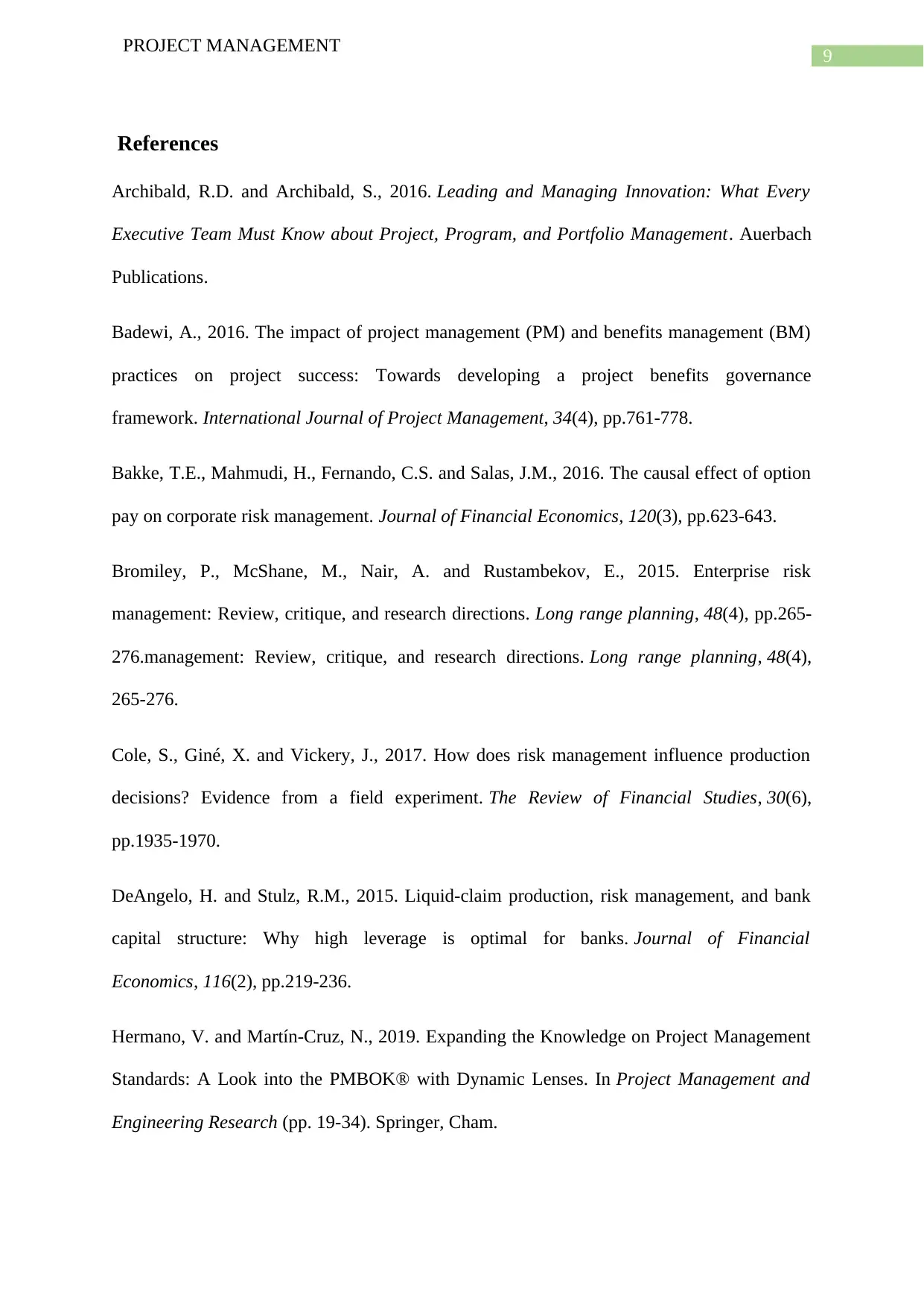
9
PROJECT MANAGEMENT
References
Archibald, R.D. and Archibald, S., 2016. Leading and Managing Innovation: What Every
Executive Team Must Know about Project, Program, and Portfolio Management. Auerbach
Publications.
Badewi, A., 2016. The impact of project management (PM) and benefits management (BM)
practices on project success: Towards developing a project benefits governance
framework. International Journal of Project Management, 34(4), pp.761-778.
Bakke, T.E., Mahmudi, H., Fernando, C.S. and Salas, J.M., 2016. The causal effect of option
pay on corporate risk management. Journal of Financial Economics, 120(3), pp.623-643.
Bromiley, P., McShane, M., Nair, A. and Rustambekov, E., 2015. Enterprise risk
management: Review, critique, and research directions. Long range planning, 48(4), pp.265-
276.management: Review, critique, and research directions. Long range planning, 48(4),
265-276.
Cole, S., Giné, X. and Vickery, J., 2017. How does risk management influence production
decisions? Evidence from a field experiment. The Review of Financial Studies, 30(6),
pp.1935-1970.
DeAngelo, H. and Stulz, R.M., 2015. Liquid-claim production, risk management, and bank
capital structure: Why high leverage is optimal for banks. Journal of Financial
Economics, 116(2), pp.219-236.
Hermano, V. and Martín-Cruz, N., 2019. Expanding the Knowledge on Project Management
Standards: A Look into the PMBOK® with Dynamic Lenses. In Project Management and
Engineering Research (pp. 19-34). Springer, Cham.
PROJECT MANAGEMENT
References
Archibald, R.D. and Archibald, S., 2016. Leading and Managing Innovation: What Every
Executive Team Must Know about Project, Program, and Portfolio Management. Auerbach
Publications.
Badewi, A., 2016. The impact of project management (PM) and benefits management (BM)
practices on project success: Towards developing a project benefits governance
framework. International Journal of Project Management, 34(4), pp.761-778.
Bakke, T.E., Mahmudi, H., Fernando, C.S. and Salas, J.M., 2016. The causal effect of option
pay on corporate risk management. Journal of Financial Economics, 120(3), pp.623-643.
Bromiley, P., McShane, M., Nair, A. and Rustambekov, E., 2015. Enterprise risk
management: Review, critique, and research directions. Long range planning, 48(4), pp.265-
276.management: Review, critique, and research directions. Long range planning, 48(4),
265-276.
Cole, S., Giné, X. and Vickery, J., 2017. How does risk management influence production
decisions? Evidence from a field experiment. The Review of Financial Studies, 30(6),
pp.1935-1970.
DeAngelo, H. and Stulz, R.M., 2015. Liquid-claim production, risk management, and bank
capital structure: Why high leverage is optimal for banks. Journal of Financial
Economics, 116(2), pp.219-236.
Hermano, V. and Martín-Cruz, N., 2019. Expanding the Knowledge on Project Management
Standards: A Look into the PMBOK® with Dynamic Lenses. In Project Management and
Engineering Research (pp. 19-34). Springer, Cham.
Paraphrase This Document
Need a fresh take? Get an instant paraphrase of this document with our AI Paraphraser
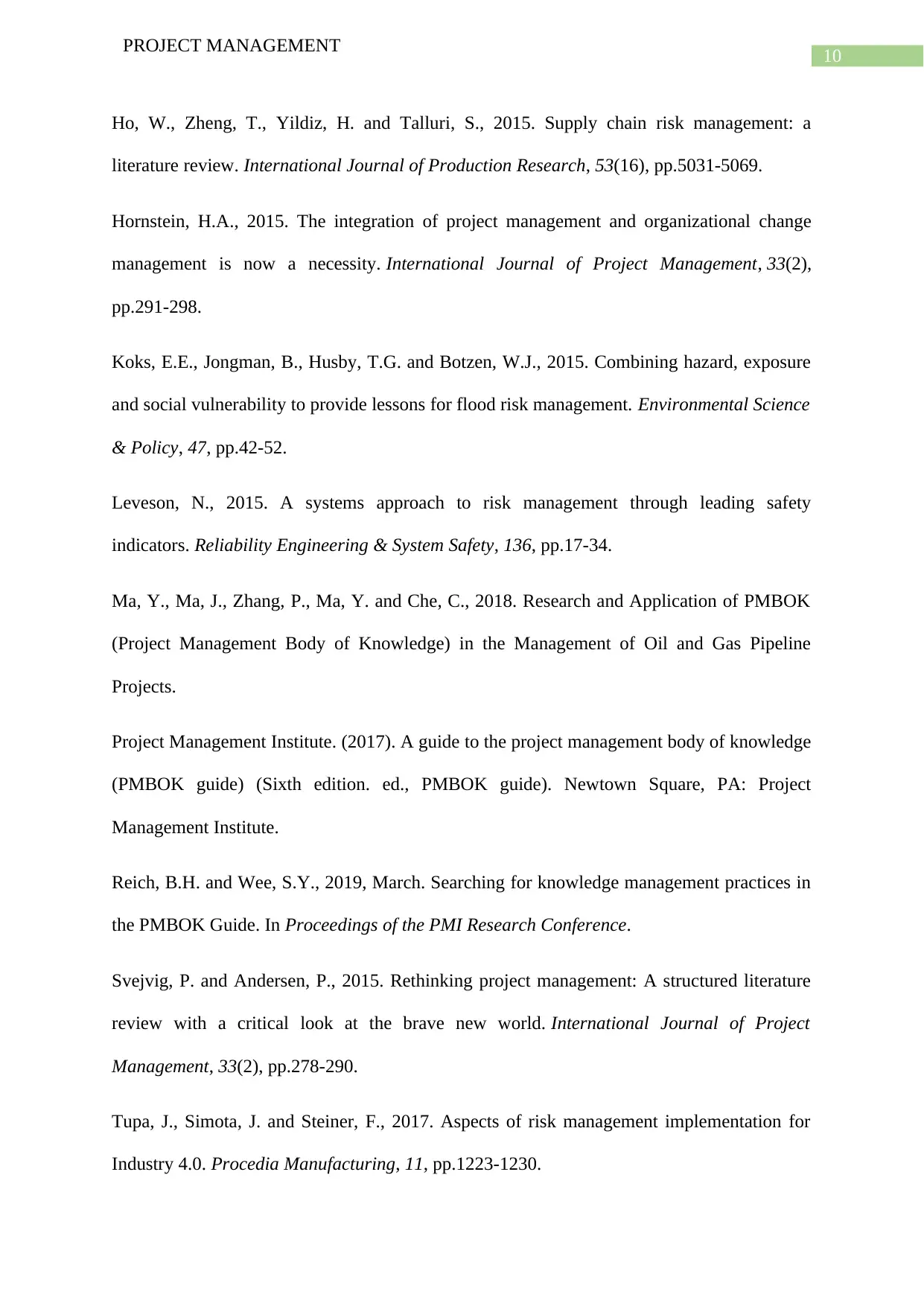
10
PROJECT MANAGEMENT
Ho, W., Zheng, T., Yildiz, H. and Talluri, S., 2015. Supply chain risk management: a
literature review. International Journal of Production Research, 53(16), pp.5031-5069.
Hornstein, H.A., 2015. The integration of project management and organizational change
management is now a necessity. International Journal of Project Management, 33(2),
pp.291-298.
Koks, E.E., Jongman, B., Husby, T.G. and Botzen, W.J., 2015. Combining hazard, exposure
and social vulnerability to provide lessons for flood risk management. Environmental Science
& Policy, 47, pp.42-52.
Leveson, N., 2015. A systems approach to risk management through leading safety
indicators. Reliability Engineering & System Safety, 136, pp.17-34.
Ma, Y., Ma, J., Zhang, P., Ma, Y. and Che, C., 2018. Research and Application of PMBOK
(Project Management Body of Knowledge) in the Management of Oil and Gas Pipeline
Projects.
Project Management Institute. (2017). A guide to the project management body of knowledge
(PMBOK guide) (Sixth edition. ed., PMBOK guide). Newtown Square, PA: Project
Management Institute.
Reich, B.H. and Wee, S.Y., 2019, March. Searching for knowledge management practices in
the PMBOK Guide. In Proceedings of the PMI Research Conference.
Svejvig, P. and Andersen, P., 2015. Rethinking project management: A structured literature
review with a critical look at the brave new world. International Journal of Project
Management, 33(2), pp.278-290.
Tupa, J., Simota, J. and Steiner, F., 2017. Aspects of risk management implementation for
Industry 4.0. Procedia Manufacturing, 11, pp.1223-1230.
PROJECT MANAGEMENT
Ho, W., Zheng, T., Yildiz, H. and Talluri, S., 2015. Supply chain risk management: a
literature review. International Journal of Production Research, 53(16), pp.5031-5069.
Hornstein, H.A., 2015. The integration of project management and organizational change
management is now a necessity. International Journal of Project Management, 33(2),
pp.291-298.
Koks, E.E., Jongman, B., Husby, T.G. and Botzen, W.J., 2015. Combining hazard, exposure
and social vulnerability to provide lessons for flood risk management. Environmental Science
& Policy, 47, pp.42-52.
Leveson, N., 2015. A systems approach to risk management through leading safety
indicators. Reliability Engineering & System Safety, 136, pp.17-34.
Ma, Y., Ma, J., Zhang, P., Ma, Y. and Che, C., 2018. Research and Application of PMBOK
(Project Management Body of Knowledge) in the Management of Oil and Gas Pipeline
Projects.
Project Management Institute. (2017). A guide to the project management body of knowledge
(PMBOK guide) (Sixth edition. ed., PMBOK guide). Newtown Square, PA: Project
Management Institute.
Reich, B.H. and Wee, S.Y., 2019, March. Searching for knowledge management practices in
the PMBOK Guide. In Proceedings of the PMI Research Conference.
Svejvig, P. and Andersen, P., 2015. Rethinking project management: A structured literature
review with a critical look at the brave new world. International Journal of Project
Management, 33(2), pp.278-290.
Tupa, J., Simota, J. and Steiner, F., 2017. Aspects of risk management implementation for
Industry 4.0. Procedia Manufacturing, 11, pp.1223-1230.
1 out of 11
Related Documents
Your All-in-One AI-Powered Toolkit for Academic Success.
+13062052269
info@desklib.com
Available 24*7 on WhatsApp / Email
![[object Object]](/_next/static/media/star-bottom.7253800d.svg)
Unlock your academic potential
Copyright © 2020–2026 A2Z Services. All Rights Reserved. Developed and managed by ZUCOL.





